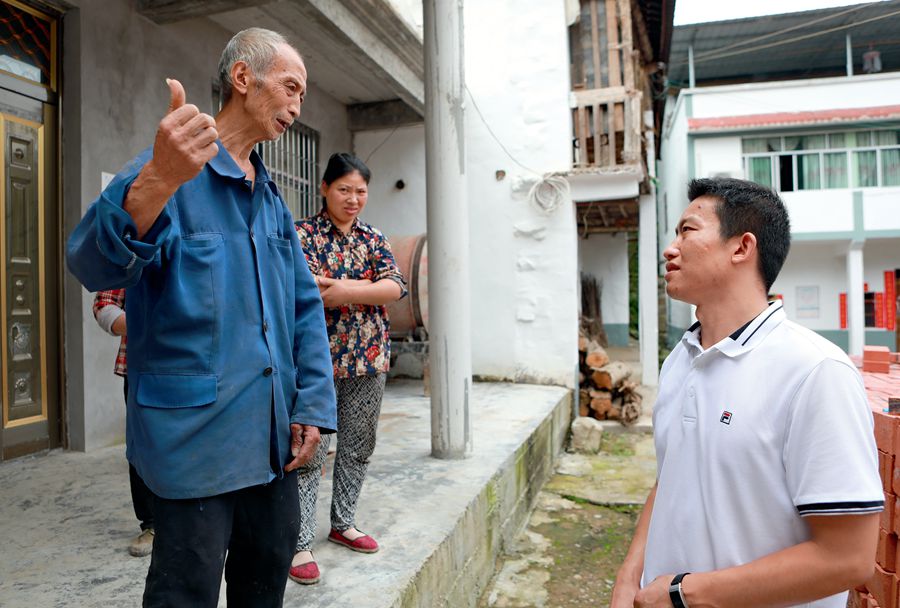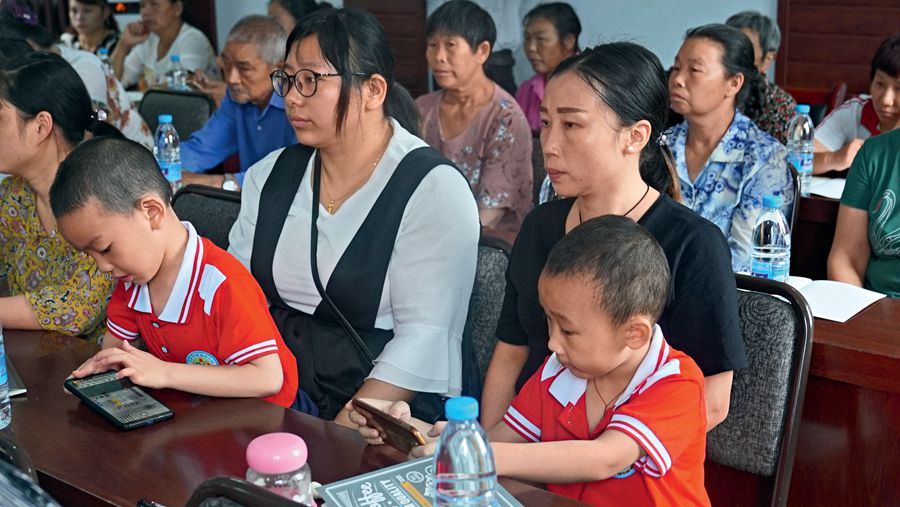CHINA’S economic miracle over four innovative decades of reform and opening-up has come at a price. The conundrum of an approach that drove the eastern coastal regions to develop at breakneck speed at the expense of a lagging central and western region, has long been an economic growth challenge.
Prosperous developed cities have generated tremendous demand for labor, prompting countless farmers to pack up their bags and leave impoverished rural homes to find their fortune in greener pastures like Beijing, Shanghai, and Guangzhou. As a result, many “hollowed villages” mainly inhabited by left-behind children, women, and the elderly have emerged.
To reverse this trend, the Chinese government has formulated and implemented a series of development plans to boost economic growth of less-developed regions. China has vowed to eradicate poverty by the end of 2020 after lifting more than 700 million people out of poverty since the commencement of its reform and opening-up drive.

Lüchunba Village is becoming a beautiful demonstration site for developing tourism.
But how will the nation achieve this goal? A county in the inland municipality of Chongqing in southwestern China provides a model example.
Poverty Amid a Scenic Backdrop
Fengdu County falls under the jurisdiction of Chongqing, a populous provincial-level municipality directly administered by the central government. To a large extent, Fengdu retains the characteristics of many rural areas in China.
About a two-hour drive from Chongqing Jiangbei International Airport, Fengdu is located deep in the Three Gorges Reservoir area and has a population of 830,000. The Yangtze River wanders through forested valleys in the county, with many places still retaining its primitive ecology. Due to frequent rainfall, the air is humid and soil wet for most of the year. Waterfalls are also common in the area.
The picturesque pastoral scenery makes first-time visitors forget that Fengdu remains an underdeveloped county lagging far behind the development seen in the rest of the country. In 2002, it was rated as a national poverty-stricken county, a title it has battled to uncap for 15 years, and finally relinquished in 2017. However, the county still suffers many challenges, most notably imbalanced development between rural and urban areas.
Moreover, Fengdu is plagued by “hollowed villages.” The unfavorable geographical conditions in some areas make it even harder for them to develop modern agriculture. Most of the county’s 30 townships are still lagging far behind when it comes to economic development.

Lüchunba Village carries out a re-novation project to improve local people’s living environment.
Based on the county’s actual conditions and unique challenges, the local government has implemented many innovative measures to overcome these challenges and consolidate the achievements made in poverty alleviation, setting an example for other regions.
Regaining Vitality
A distance of about 30 kilometers separates the county seat from Lüchunba Village, Sanjian Township. In our drive there, we crossed the Longhe River, a branch of the Yangtze River, before we finally reached a residential settlement belonging to the village. The riverside settlement is home to 18 households, but only 10 still have members living here. Because the village lacks job opportunities, nearly half of the local villagers have migrated to cities for jobs.
“The village has little arable land, with limited output,” said Zhu Xiaodong, vice chief of Sanjian Township. Old buildings dating back to the 1950s and 60s were of great value for architectural research, but most were dilapidated after decades of weathering. Left-behind villagers were either elderly or disabled, meaning they were unable to repair their houses. The small village seemed to be on its last legs.
However, Yang Ming, first secretary of the stationed team in the village for poverty alleviation, came up with an idea that changed its fate. He envisaged the village as a popular tourist spot, given its proximity to the urban areas of Fengdu County as well as Chongqing Municipality, which would benefit local farmers.
Yang, together with his colleagues and local villagers, worked out a development plan integrating cultural heritage protection, environmental conservation, and economic growth.
They initially used funds provided by the state to improve the village’s infrastructure and public facilities. This included paving roads, building bamboo bridges over streams, and constructing public toilets. Today, Lüchunba Village hidden in a picturesque valley is a tourist haven with a rural hotel under construction on the nearby hillside.
The investment by the government has paid off. Not only has the living environment of local villagers improved, but also the village’s potential for tourism development has become apparent. For this reason, local tourism developers were enthusiastic about providing funds to repair the old buildings. “If villagers choose to move to cities, they can rent out their repaired and renovated houses to the tourism company for commercial use for a period, and both parties share the profits,” explained Zhu.

Tourism has boomed quickly in the village, but it will still take some time to fully realize its potential. Villagers are confident that their part of the world will become the “green pearl” of Fengdu tourism and their tranquil valley an ideal place for urbanites to destress and relax.
The rapid development of Chinese cities has generated huge amounts of capital, part of which needs to flow to rural areas — through direct investment by enterprises or consumption by tourists from cities — to boost the development of the rural economy. Farmers can earn substantial income by renting out their homes as guesthouses, operating specialty restaurants and selling handicrafts, which helps to stem the tide of migration.
Bringing Entrepreneurship Back to Villages
Along with the money they bring back, migrant workers returning from cities also bring a newly acquired entrepreneurial spirit. Zhang Yuan, a native of Tianshui Village in Xingyi Town, Fengdu County, is an example of young entrepreneurs now operating in the village.
Born in 1986, Zhang made the trek to Beijing as a migrant worker after graduating from middle school like many rural youngsters of his generation. Arriving in the capital in 2003 with his cousin, he worked as a waiter and then a cook in a restaurant. He also tried an online sales job, but that didn’t work out.
In 2010, Zhang decided to return to his hometown, intending to get married. He also brought back work experience and entrepreneurial spirit which he had found everywhere in the capital city.
“I couldn’t stay a migrant worker my whole life,” he said. “I wanted a more fulfilling life through a more independent profession, so I made up my mind to start my own business back home.”
Now, Zhang is one of 100 e-commerce brokers working in Fengdu. The program is supported by the local government with an aim to help rural areas keep pace with booming e-commerce in cities.
Online shopping has become an integral part of daily life in Chinese cities. However, many rural areas have yet to benefit from the e-commerce frenzy. “The primary reason for this is underdeveloped delivery services in remote villages,” said Huang Hong, vice director of the Committee on Commerce of Fengdu County.
However, the situation is improving. In 2017, a package distribution center was set up in the county. Packages transported by large express companies from around the nation arrive at the center before they are sorted for individual couriers to deliver them. Conversely, villagers selling local agricultural products online also distribute their parcels through the center.
Every day, Zhang and his colleagues load up packages from the distribution center and deliver them to designated villages. Then, they collect agricultural products ordered online, pack them and take them back to the distribution center. They connect local farmers with online market opportunities across the country.

Thirty-five-year-old He Lianhua (front, right), a student of the “school for parents,” attends classes with her youngest son.
“Now, agricultural products arrive at the distribution center within 24 hours after buyers order them online,” said Huang. “From there they go to every corner of China.”
Zhang now has two children and his dream of starting a business has come true. “Although my income is similar to working as a migrant worker in big cities, the perks are better — I can live with my family.”
“School for Parents”
Education is the key to wealth creation and equal opportunities. Over the past few years, Fengdu County has made key achievements in educational development. To narrow the educational gap between the county and larger cities, the local government embraced innovative educational ideas.
The county’s Huwei Town — more specifically, Daxi Village in the town — has accumulated useful experience with innovative education concepts. “Compared to its peers in other areas, the village’s school lags behind in terms of facilities and curriculum,” revealed Hu Xiaofei, vice director of the Moral Education Office of Binjiang Middle School in Fengdu. “Of the village’s 65 children aged three to 17, 22 are being raised by grandparents because their parents are working elsewhere.”
During China’s rapid development over the past four decades, a massive intergenerational gap has also appeared. “This gap is particularly obvious in educational methods,” said Qin Jiaxiong, vice director of the Trade Union of Binjiang Middle School, who works in Daxi Village on poverty reduction through promoting education.
“Poverty alleviation through education should have started with these children’s parents,” said Qin, adding that they would have been able to teach their own children and guide them. Based on this philosophy, he conceived an educational program not for children but for parents, called “School for Parents.” Last year, the first School for Parents began offering free courses on child education for parents once a month. The courses involve a wide array of topics including how to cultivate team spirit, independence, and how to meet goals in life.
He Lianhua, 35, is a student at the School for Parents. She has two sons, who are five and 15 years old. The older son was mainly raised by his grandparents because He worked in a factory in Guangdong Province for eight years and He’s husband worked as a long-distance truck driver. “Over the years, we felt our older son slipping away from us,” said He. She said the boy was uncontrollable and refused to obey his parents. Since attending the School for Parents, He has found herself rethinking her parenting methods.
“The courses helped me better understand myself. I’m no longer thinking only about myself when educating my children and stopped blaming things on my son.”
Years spent living in cities helped He broaden her vision. She is eager to learn and hopes her children will have a better future. “Farmers need to keep pace with the times to connect with people from other spectrums of society and communicate with them,” she said. In her eyes, the School for Parents provides an ideal platform to assist parents to understand their children better.
To spread innovative education, Qin Jiaxiong compiled relevant textbooks and distributed them in poverty-stricken areas. At the same time, a group of projects like the School for Parents program have been carried out around Fengdu.
A Long Way to Go
Fengdu’s successes prove that funds, entrepreneurial spirit, and innovative education ideas — all important factors driving development — have played their parts in China’s poverty alleviation drive. But, there is still a long way to go for the living standard in underdeveloped regions to catch up with developed coastal areas.
From a long-term perspective, only when different regions enjoy equal opportunities and developed areas actively help those that are less-developed can the whole country achieve coordinated development. Ensuring that China achieves better development and common prosperity requires proactive measures. To this end, we must ensure funds and other resources are properly used where they are most needed and not wasted, which serves as a guarantee for the country’s final success in battling against poverty.
It can’t be denied that those poverty alleviation efforts have guaranteed poor people’s rights to subsistence and development. Only after shaking off poverty, they can better seek other rights and realize more possibilities of their lives.



